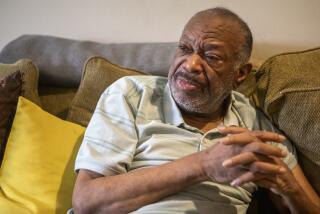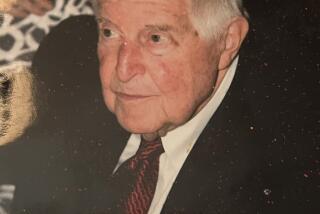Richard S. Amador Sr. dies at 75; expert in community economic development
Richard S. Amador Sr., a California-born son of migrant farmworkers who became a nationally recognized expert in community and economic development and formed a nonprofit group that created thousands of jobs for East Los Angeles residents, has died. He was 75.
Amador died of esophageal cancer Sept. 19 at his home in Monterey Park, said his daughter, Cynthia Amador-Diaz.
In 1967, Amador founded what became known as CHARO Community Development Corp., a nonprofit organization that was headquartered in East L.A. for more than four decades.
By the time he retired as president and chief executive in early 2003, CHARO had been listed by Hispanic Business Magazine as one of the top 12 Latino nonprofits in the nation and reportedly was the leading job-placement agency in L.A.
At the time, CHARO had facilitated the funding of more than $26 million in small business and commercial loans to hundreds of small businesses, and its career center had placed more than 16,000 primarily East L.A. residents in jobs.
“Richard Amador Sr. was a wonderful pioneer and mentor for many leaders in Los Angeles and throughout the region,” Los Angeles Mayor Antonio Villaraigosa said in a statement to The Times.
Describing Amador as “a wonderful friend and guiding figure” who led by example, Villaraigosa said “Los Angeles was so fortunate to have a leader like Richard.”
CHARO also offered affordable housing and in the ‘90s operated two 24-unit apartment complexes in East Los Angeles. Other services over the years included a sheltered workshop for developmentally disabled adults and a child-care center that served 180 children.
“This is what I was supposed to do,” Amador said of his work in a 2002 interview with the Los Angeles Wave.
He was a member of President Johnson’s Office of Economic Opportunity when he arrived in L.A. in the mid-’60s after being assigned to the president’s Commission on Manpower.
“I learned that only nine cents of every dollar of the War on Poverty was going to Latino organizations and all the rest were going to other minority organizations,” he said in the 2002 interview. “I kept raising the issue, and I was told that Mexican Americans — we weren’t [grouped as] Latinos at the time — were a regional issue.”
He took a six-month leave of absence to establish an economic development organization in L.A.
“At the end of six months, we weren’t finished so I asked for another six-month leave,” he recalled. “At the end of that six months, we were far from finished, so I resigned.”
That, he said, caused a lot of his friends in the administration to wonder what he was doing.
“They said, ‘We got you a civil service appointment. Your job in the government is secure. You have security.’ But it was nothing I hungered for, so I resigned and took a dive, and that was how we started CHARO.”
The organization, which operated mostly on publicly funded state and federal contracts, closed in March, a victim of the recession.
“When all that money dried up, it couldn’t sustain itself,” said Cynthia Amador-Diaz. “It was very heartbreaking for the family.”
She had taken over as president and chief executive of CHARO when her father retired.
“That was his life,” she said. “His love was serving the community and creating economic opportunities for people.”
“Years later, I’d have people come back and say, ‘I went to your dad, who helped me get a scholarship’ or said, ‘He helped my mom build her first business.’ It was really gratifying to hear from people who came back.”
Born Dec. 21, 1935, in Stockton, Amador was the youngest of eight children. He joined his parents and siblings in the fields when he was 5 and attended 15 schools as his family picked crops throughout the San Joaquin Valley before buying a small house in Stockton.
Amador, who attended Stockton College and served in the Army National Guard, became a lobbyist for the Teamsters in Sacramento in his 20s.
As a lobbyist, his family said, he played a key role in drafting and assisting in the passage of legislation to protect the rights of workers, including the establishment of night courts so that workers would not have to take time off and lose pay to go to court.
Amador joined the Johnson administration after co-chairing the Viva Johnson effort to turn out the Latino vote during Johnson’s 1964 presidential campaign.
He received numerous awards and honors for his civic leadership, including the 2002 Lifetime Achievement Award from the Small Business Administration and the 2003 Lifetime Achievement Award from the U.S. Department of Commerce.
In addition to his daughter, Amador is survived by his wife, Theresa; his son, Richard; his brother, Daniel; and four grandchildren.
A memorial service will be held Monday at Rose Hills Memorial Park in Whittier.
More to Read
Start your day right
Sign up for Essential California for the L.A. Times biggest news, features and recommendations in your inbox six days a week.
You may occasionally receive promotional content from the Los Angeles Times.




















































